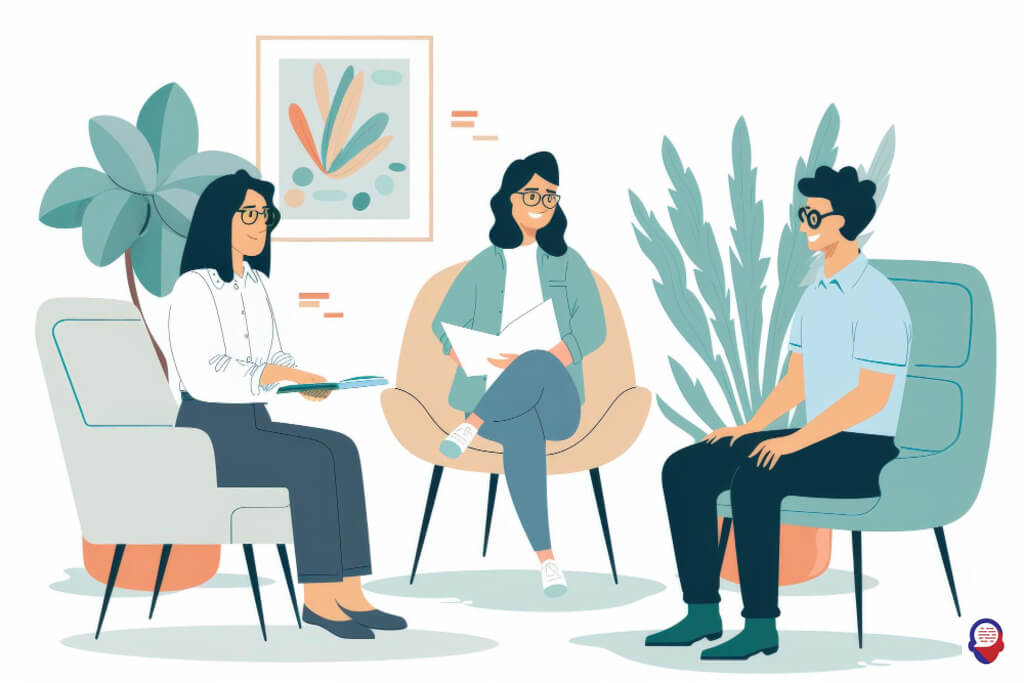Finding Your Voice: Overcoming Depression with Therapy
Depression can feel like an invisible cage. The world outside continues, vibrant and loud, while inside, you’re trapped in a silent, grey fog. It drains your energy, steals your joy, and whispers lies that you are alone in your struggle. But there is a powerful, evidence-based key that can help you unlock that cage, and it begins with a conversation. This is the world of talk therapy, a journey of healing that is far more than just talking about your problems.
This article is your comprehensive guide to understanding how talk therapy, or psychotherapy, works as a formidable tool against depression. We will explore what it truly is, the profound ways it can change your mind and brain, the different types available, and what you can realistically expect when you take that brave first step. This is not a path you have to walk alone.

What Exactly Is Talk Therapy for Depression?
Talk therapy is a collaborative treatment where you work with a trained mental health professional in a safe and confidential environment. The goal is to explore and understand the thoughts, feelings, and behaviours that contribute to your depression, and to develop effective strategies to manage them and improve your overall well-being.
It’s a common misconception that therapy is simply venting or paying someone to be your friend. While having a supportive person to talk to is part of it, psychotherapy is a structured, goal-oriented process rooted in psychological science. Your therapist is not just a passive listener, they are a skilled guide, trained to use specific techniques to help you see your life and your struggles from a new perspective.
Unlike talking with a friend or family member, a therapist offers an objective, non-judgmental viewpoint. They are not entangled in your daily life, which allows them to see patterns you might miss. They are trained to challenge you constructively, to help you connect the dots between your past and your present, and to equip you with practical tools to carry into your everyday life.
The ultimate aim of talk therapy for depression is not just symptom relief. It’s about building resilience. It’s about learning the skills to navigate life’s inevitable challenges long after your sessions have ended, empowering you to become your own therapist over time.

How Can Talking Actually Change Your Brain?
The act of engaging in talk therapy can create profound and measurable changes in your brain’s structure and activity. This process, known as neuroplasticity, allows your brain to form new connections and pathways, effectively rewiring itself in response to new experiences, thoughts, and behaviours, just as exercise builds muscle.
Therapy is an active process of learning and unlearning. When you consistently work to challenge negative thoughts, regulate difficult emotions, and try new behaviours, you are literally forging new neural pathways. These new pathways make healthier ways of thinking and reacting more automatic, while the old, depressive pathways begin to weaken from disuse. It is the brain’s incredible ability to adapt, and therapy provides the structured workout it needs to adapt in a positive direction.
This isn’t just a theory, it’s something scientists can see. Brain imaging studies have shown that successful psychotherapy can alter activity in key areas of the brain. It can strengthen the prefrontal cortex, the part of your brain responsible for reasoning, problem-solving, and emotional control. At the same time, it can help calm the amygdala, the brain’s fear and threat-detection center, which is often overactive in people with depression and anxiety.

Does Therapy Rewire Your Neural Pathways?
Yes, a core function of effective talk therapy is to help you intentionally rewire your brain’s neural pathways. By repeatedly engaging in new ways of thinking and behaving, you strengthen the connections between neurons, creating "superhighways" for positive thoughts and coping mechanisms, making them easier and more natural to access.
Think of your brain’s pathways like trails in a forest. The thoughts you have most often are like well-worn paths, easy to follow without thinking. Depressive thinking carves deep, muddy ruts that are difficult to get out of. Therapy is like a guided hike where you and your therapist work together to clear new, sunnier trails.
At first, walking these new paths takes conscious effort and feels unfamiliar. You might find yourself slipping back into the old ruts. But with consistent practice, through the exercises and insights gained in therapy, these new trails become wider, smoother, and your preferred route. The old, depressive paths become overgrown and less travelled, fundamentally changing your mental landscape.
This rewiring process is what leads to lasting change. You aren’t just suppressing negative thoughts, you are building a new cognitive architecture that is inherently more resilient and less susceptible to the pull of depression. It is an active, empowering process of brain transformation.

Can It Regulate Your Chemical Imbalances?
While medication works by directly influencing neurotransmitters like serotonin, talk therapy helps your brain regulate its own chemical environment through behavioural and cognitive changes. It addresses the root causes of stress and emotional distress, which in turn helps to balance your brain’s chemistry naturally.
Your thoughts and experiences have a direct impact on your body’s chemistry. Chronic stress and negative thought loops, common in depression, can lead to an overproduction of stress hormones like cortisol. High levels of cortisol can disrupt sleep, appetite, and mood, and can even interfere with the proper functioning of neurotransmitters.
Talk therapy gives you the tools to manage the sources of this stress. By learning to challenge catastrophic thinking, resolve interpersonal conflicts, and engage in self-soothing behaviours, you reduce the physiological stress response. This allows your body to lower cortisol levels and can help your brain’s own systems for producing mood-regulating chemicals like serotonin and dopamine to function more effectively.
In this way, therapy and medication can be powerful allies. While medication can provide the chemical stability needed to engage in therapy, therapy provides the skills to maintain that stability long-term by changing the thoughts and behaviours that created the imbalance in the first place.

What Are the Different Types of Talk Therapy for Depression?
There are several highly effective, evidence-based forms of talk therapy for depression, each with a unique approach and focus. The best type for you depends on your specific symptoms, your personality, and what you hope to achieve, allowing you to find a therapeutic style that feels like the right fit.
The existence of different modalities is a strength of the field, not a confusion. It acknowledges that there is no one-size-fits-all path to healing. Some people benefit from a structured, practical approach, while others need to explore the deeper roots of their pain. Understanding the main types can empower you to have a more informed conversation when seeking a therapist.
We will explore some of the most well-researched and commonly practiced therapies for depression. This includes Cognitive Behavioural Therapy (CBT), Interpersonal Therapy (IPT), and Psychodynamic Therapy. Each offers a different lens through which to view and work through the challenges of depression.

What is Cognitive Behavioural Therapy (CBT)?
Cognitive Behavioural Therapy, or CBT, is a highly practical and goal-oriented form of therapy focused on identifying, challenging, and changing the unhelpful thought patterns and behaviours that fuel depression. It operates on the principle that your thoughts, feelings, and actions are interconnected, and that changing one can positively influence the others.
In CBT, you and your therapist work as a team to uncover the specific negative thought cycles, often called "cognitive distortions," that contribute to your low mood. These might include patterns like black-and-white thinking, jumping to conclusions, or overgeneralizing from a single negative event. You learn to spot these thoughts as they happen and evaluate them based on evidence, rather than accepting them as fact.
A key part of CBT is the behavioural component. Your therapist will help you schedule positive activities, break down overwhelming tasks into manageable steps, and practice new social skills. You will often be given "homework" between sessions, such as keeping a thought record or practicing a new behaviour. This practical, hands-on approach is designed to build momentum and give you tangible proof that you can influence your own mood.
Because of its structured and skills-based nature, CBT is often a shorter-term therapy. It is one of the most extensively researched therapies for depression and has a strong track record of success, equipping you with a concrete toolkit for managing your mental health for years to come.

How Does Interpersonal Therapy (IPT) Work?
Interpersonal Therapy, or IPT, is a focused, time-limited therapy that connects your depressive symptoms directly to your relationships and social context. The core idea is that our moods and our interactions with others are deeply intertwined, and that by improving our relationships, we can significantly alleviate depression.
IPT sessions concentrate on resolving problems within one of four key areas. The first is unresolved grief, helping you process the loss of a loved one. The second is interpersonal role disputes, which involve conflicts and unmet expectations with significant people in your life, such as a partner, family member, or colleague.
The third area is role transitions, which addresses the difficulty of adapting to major life changes, like becoming a parent, changing careers, or retiring. The fourth, interpersonal deficits, is for those who have a history of struggling to form and maintain healthy relationships. Your therapist helps you identify which area is most relevant to your depression and then focuses treatment there.
Unlike other therapies that might delve deep into childhood, IPT stays focused on your current relationships and how they impact your mood right now. It is a practical therapy that helps you learn to communicate more effectively, set healthier boundaries, and build a stronger social support network, recognizing that human connection is a powerful antidepressant.

What is Psychodynamic Therapy?
Psychodynamic therapy is a form of depth psychology that aims to help you understand how your unconscious mind and past experiences, particularly from early life, shape your current feelings, thoughts, and behaviours. It is based on the idea that depression can stem from unresolved conflicts and buried emotions that are outside of your conscious awareness.
The therapeutic process in psychodynamic therapy is often less structured and more exploratory than CBT or IPT. You are encouraged to speak freely about whatever comes to mind, a technique that helps reveal underlying patterns and themes. The therapist listens for these patterns, helping you make connections between your past and your present struggles.
A central element is the therapeutic relationship itself. The way you interact with your therapist can often mirror the relationship patterns you have with others in your life. By exploring this dynamic in the safe space of therapy, you can gain profound insight into your relational habits and work to change them in a healthy way.
Psychodynamic therapy is typically a longer-term process, as it seeks not just to relieve symptoms but to foster deep self-understanding and personality change. It can be particularly helpful for those who have experienced chronic depression or feel that their struggles are rooted in long-standing, complex issues that other therapies haven’t fully addressed.

Are There Other Effective Approaches?
Yes, beyond the "big three," a range of other evidence-based therapies offer powerful and unique ways to approach depression. These alternative models provide even more options, ensuring that you can find a therapeutic style that truly resonates with your worldview and personal struggles.
Acceptance and Commitment Therapy (ACT), for example, takes a different approach from CBT. Instead of trying to change or eliminate difficult thoughts and feelings, ACT teaches you to accept them as a normal part of human experience. The focus shifts to clarifying your personal values and committing to actions that align with those values, even in the presence of pain. It is about building a rich and meaningful life alongside your struggles, rather than waiting for them to disappear.
Humanistic therapies, such as Person-Centred Therapy, are founded on the belief that every individual has an innate capacity for growth and healing. The therapist provides a supportive, empathetic, and non-judgmental environment to help you access your own inner wisdom and find your own solutions. The focus is less on technique and more on the genuine, warm relationship between you and the therapist as the primary vehicle for change.
 What Can You Expect in Your First Therapy Session?“/>
What Can You Expect in Your First Therapy Session?“/>What Can You Expect in Your First Therapy Session?
Your first therapy session is primarily an "intake" appointment, designed for you and your therapist to get to know each other. It is a two-way street, where the therapist gathers information about you, and you get a feel for their style to decide if they are a good fit for you.
The therapist will likely ask a series of questions about what brought you to therapy, the specific symptoms you’re experiencing, and your personal history. This can include questions about your family, relationships, work or school life, and any past experiences with mental health challenges. This information helps them begin to form a picture of your situation and develop a potential treatment plan.
It is crucial to remember that you are in control. You do not have to share anything you are not comfortable with, especially in the first meeting. A good therapist will understand this and work to build a foundation of trust and safety. It’s perfectly okay to say, "I’m not ready to talk about that yet."
This first session is also your chance to interview them. You can ask about their therapeutic approach, their experience with treating depression, and what you can expect from working with them. The most important outcome of a first session is feeling heard, respected, and hopeful. Feeling a sense of connection and safety with your therapist is one of the biggest predictors of successful therapy.

How Do You Know If Therapy Is Working?
You will know therapy is working not through a sudden, dramatic cure, but through a series of small, consistent shifts in your daily life. Progress is often subtle at first, manifesting in how you think, feel, and react to situations, even if your overall mood hasn’t lifted entirely yet.
One of the first signs is often a small flicker of hope. Simply taking the step to get help and having a dedicated space to be heard can create a sense of possibility that was absent before. You might start noticing your own negative thought patterns, which is a crucial first step before you can change them. You might find yourself pausing before reacting angrily to a situation that would have previously triggered you.
Other signs of progress include feeling more connected to others, having a bit more energy, or finding that you are able to accomplish small tasks that felt impossible before. Your sleep might improve, or you might find moments of genuine enjoyment in activities again. It’s about seeing the "grey" instead of just black and white.
It is vital to understand that progress is not a straight line. You will have good weeks and bad weeks, good days and bad days. This is normal. The true measure of progress is the overall trajectory over time. Discussing your progress with your therapist is also key, as they can help you recognize changes you might not have noticed yourself.
Frequently Asked Questions

How long does therapy for depression take?
The duration of therapy for depression varies significantly from person to person. For structured, goal-oriented therapies like CBT or IPT, treatment can often be time-limited, ranging from 12 to 20 weeks. For more exploratory approaches like psychodynamic therapy, or for more complex or chronic depression, therapy can last for a year or longer. The timeline is something you and your therapist will discuss and agree upon together.

Is what I say in therapy truly confidential?
Yes, confidentiality is a legal and ethical requirement and a fundamental cornerstone of the therapeutic relationship. A therapist cannot share what you discuss with anyone without your explicit written permission. The only exceptions are very specific situations where there is an immediate risk of serious harm to yourself or to another identifiable person, or in cases of child abuse, as mandated by law. Your therapist will explain these limits to you in your first session.

What if I don’t like my therapist?
It is perfectly normal and acceptable to find that a particular therapist is not the right fit for you. The connection and rapport between you and your therapist, known as the "therapeutic alliance," is one of the most critical factors for a successful outcome. If you don’t feel comfortable, understood, or respected, you have every right to seek out a different professional. A good therapist will not be offended by this and may even be able to help you find someone who is a better match.
Depression can make you feel isolated, but you don’t have to navigate this journey alone. At Counselling-uk, we provide a safe, confidential, and professional place for you to find your voice and begin to heal. We believe in offering compassionate support for all of life’s challenges, big and small. When you’re ready to take the first step, we’re here to listen. Reach out today to connect with a qualified therapist and start building your path toward a brighter tomorrow.




Getting started with talk therapy for depression can be an intimidating process. It requires a great deal of courage and trust in yourself and your therapist that you can get through it. It’s important to remember that you are taking a positive step towards improving your mental health. There are several things to consider when preparing to start talk therapy for depression.